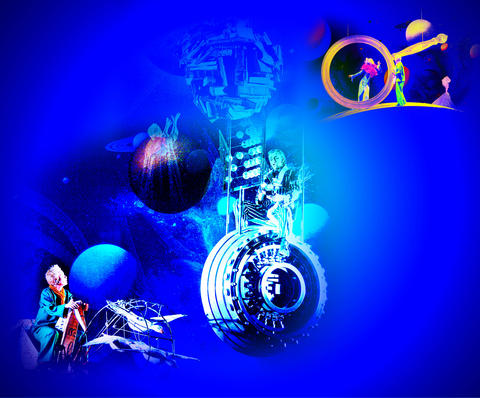Tomorrow at the National Theater, a damaged aircraft will come crashing from above. The surviving French aviator will meet a young, otherworldly prince who lives on a house-sized planet called B612. The rest of the story is known and adored by the countless people who have read Le Petit Prince since it was first published in 1943.
After the smash hit musical Notre-Dame de Paris premiered in Paris in 1998, French composer Richard Cocciante turned to Antoine de Saint-Exupery's beloved fairytale to create another visually imaginative and musically captivating stage show with the help of a team that includes acclaimed stage designer Hans Schavernoch and costume designer Jean-Charles de Castelbajac.
While the lyrics are faithful to the original text in the novel, the elaborate production is furnished with kaleidoscopic effects that bring the imaginative cosmos of the novel into the real world. Over 300 stage mechanisms provide special effects to wow and dazzle non-stop. The phantasmagorical backdrops lead the audience through the floating planets inhabited by a motley crew of whimsical characters like the King, the Conceited Man and the Geographer.

The show sports a first-rate cast led by Laurent Ban, who plays the pilot-narrator and starred in the French-language productions of Les Miserables and Phantom of the Opera and 18-year-old Manon Taris, who was selected to play the little prince for the Asian tour.
Le Petit Prince premiered at the Casino de Paris in 2002, but the production's enormous scale and technological sophistication delayed the advent of international tours. Five years after the show opened, it is now finally ready to leave France for its Asian tour, first in China's Shanghai Oriental Arts Center (上海東方藝術中心) then at the National Theater.
"The difficulty in staging the production abroad is to find a proper theater that is big enough and has adequate technological support … The efficiency of Taiwan's technicians has been just amazing. They don't need much explaining to get the job done and the quality of locally made props is also above par," said director Bruno Carlucci.
Compared to Notre-Dame de Paris, where each number can be enjoyed as an independent piece (part of the reason why more than one million copies of the album were sold even before the theatrical version reached the stage, according to Carlucci), Le Petit Prince presents a challenge musically, as each song is an integral part of a lyrical whole.
Carlucci suggests that there might be an Oriental aspect in this presentation, which underlines aspects of the original story.
"The Little Prince, in fact, contains quite a lot of Oriental nutrients and we try to introduce the philosophical concepts of the East to a Western audience right from the beginning of the creative process," Carlucci pointed out.
Musical kinship with the East has further prompted the team to select four local performers including Cloud Gate dancer Wu Pei-shan (吳佩珊) to play the role of a snake that bit the little prince in order to send him back to his home planet.
It is also a dream fulfilled on the director's part to work with Asian artists who can lend new dance vocabularies to the show.
"There is no fixed form for French musicals, which have been constantly been reinvented. I guess it's a distinctive feature of our musicals, that is, the desire to search for the original," Carlucci said.

The primaries for this year’s nine-in-one local elections in November began early in this election cycle, starting last autumn. The local press has been full of tales of intrigue, betrayal, infighting and drama going back to the summer of 2024. This is not widely covered in the English-language press, and the nine-in-one elections are not well understood. The nine-in-one elections refer to the nine levels of local governments that go to the ballot, from the neighborhood and village borough chief level on up to the city mayor and county commissioner level. The main focus is on the 22 special municipality

The People’s Republic of China (PRC) invaded Vietnam in 1979, following a year of increasingly tense relations between the two states. Beijing viewed Vietnam’s close relations with Soviet Russia as a threat. One of the pretexts it used was the alleged mistreatment of the ethnic Chinese in Vietnam. Tension between the ethnic Chinese and governments in Vietnam had been ongoing for decades. The French used to play off the Vietnamese against the Chinese as a divide-and-rule strategy. The Saigon government in 1956 compelled all Vietnam-born Chinese to adopt Vietnamese citizenship. It also banned them from 11 trades they had previously

Jan. 12 to Jan. 18 At the start of an Indigenous heritage tour of Beitou District (北投) in Taipei, I was handed a sheet of paper titled Ritual Song for the Various Peoples of Tamsui (淡水各社祭祀歌). The lyrics were in Chinese with no literal meaning, accompanied by romanized pronunciation that sounded closer to Hoklo (commonly known as Taiwanese) than any Indigenous language. The translation explained that the song offered food and drink to one’s ancestors and wished for a bountiful harvest and deer hunting season. The program moved through sites related to the Ketagalan, a collective term for the

As devices from toys to cars get smarter, gadget makers are grappling with a shortage of memory needed for them to work. Dwindling supplies and soaring costs of Dynamic Random Access Memory (DRAM) that provides space for computers, smartphones and game consoles to run applications or multitask was a hot topic behind the scenes at the annual gadget extravaganza in Las Vegas. Once cheap and plentiful, DRAM — along with memory chips to simply store data — are in short supply because of the demand spikes from AI in everything from data centers to wearable devices. Samsung Electronics last week put out word